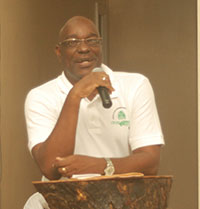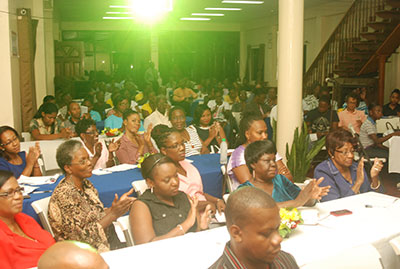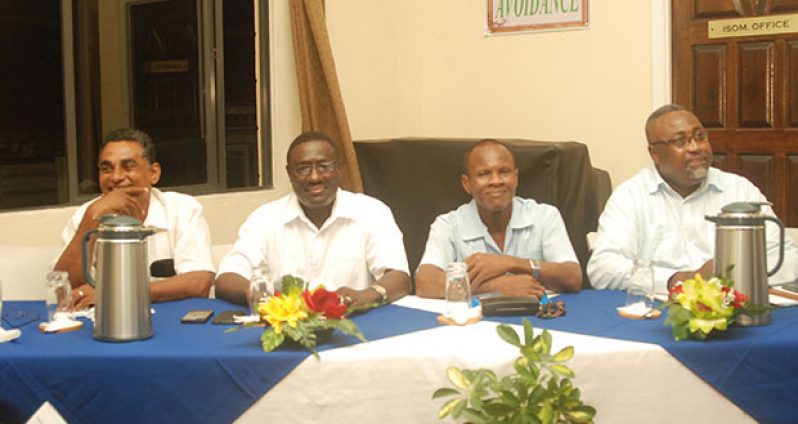A CITY consultation on waste management, held at the First Assembly of God’s ‘Generation Next’ Building on Durban Street, Wortmanville from November 13 to 15, 2014, turned out to be literally a meeting of ‘wise-men’ locked in energetic dialogue, brainstorming the issue over the three days to come up with effective ways of dealing with solid waste management in the city of Georgetown.

The forum was in effect an investigation of the solid waste management system in Georgetown with a view to bringing about an awareness of the complexity involved in solid waste management, and charting the way forward.
BEAUTIFICATION A TOP PRIORITY
There was a clarion call for a paradigm shift and a move towards making beautification of the city a top priority. The aim of the consultation, therefore, was to inculcate in people’s minds a new thinking which, first of all, places a high premium on developing an appreciation for aesthetics and a passion for beautification of the environment on the part of everyone.
To this end, the consultation sought not only to create an awareness of solid waste, but to explore avenues wherein stake-holders could come together, creating synergies as they embark on the business of helping to move Guyana back to the status of being the Garden City which it formerly enjoyed.

Head of the First Assembly of God Church, the Rev. Murtland Raphael Massiah, who delivered the overview at the opening session, told the Sunday Chronicle that the initiative was first mooted by First Assembly, but was buttressed by the Georgetown Ministers’ Fellowship and received significant buy-in from the other Christian religious bodies.
ENCOURAGING RESPONSE
The response was phenomenal. The opening session was attended by 119 keenly enthusiastic participants. The stakeholders included men and women – young and not-so-young’ – and each had some meaningful contribution to make. They came not only from the city, but from across the spectrum – individuals at the household level; the private sector; the municipality; the Ministry of Local Government, and from a number of churches -– Evangelical and Pentecostal/Orthodox, hailing from as far as the East and West Banks and the East Coast of Demerara.
Included among the stakeholders were seven facilitators who were all experts in their respective fields. They coached the participants on topics such as: What is Solid Waste Management; Best and Worst Practices of Solid Waste Management; Monitoring and Enforcement; Partnerships and Collaboration between Stakeholders; and Integrated Solid Waste Management.
On day two, the stakeholders were taken on a guided tour of the Haags Bosch Land Fill Site at Eccles.
Much energy resonated across the auditorium over the three days, as the stakeholders passionately and enthusiastically brainstormed the topics to find solutions to the problem.
Many shared with the gathering how they propose using the knowledge and information gleaned from the consultation to influence a change where they live, work and in the environment generally.
Stressing the importance of the ‘awareness component’, Rev. Massiah said: “I believe that once people become aware or are educated [on this issue], beginning at the household level, they will then understand their responsibility in this whole chain of events; and that is critical.”
Albeit, he said, both research and experience have shown that there is a disconnect between citizens and the waste they produce; that is to say, they are reluctant to take responsibility for the disposal of such waste. Hence it is always felt that somebody else is responsible for properly disposing of the garbage generated. Invariably, blame falls on the Municipality or the Ministry of Local Government.
SIGNS OF HOPE
A unique feature of the consultation was that the following parameters were set for the discussions: They should be strictly apolitical (no partisan politics), and rather than operating in an environment of pessimism or ‘spelling gloom and doom’, it should be done within the parameters of ‘Signs of Hope’ (highlighting things that are working, and moreso encouraging them) and ‘Points of Need’ (focusing on how there can be a coming-together to help).
The recent massive clean-up of Le Repentir Cemetery was identified as a success story. Likewise, the consultation wholeheartedly commended the initiative of the billion-dollar clean-up of the city and strongly recommended the sustenance of this initiative.
Throughout the intervention, immense goodwill and equanimity flowed. At conclusion of the consultation, participants committed to personally becoming involved in solid waste management, wherever possible, in the communities where they live, work, and in their places of worship.
Summing up the discussions, Rev Massiah projected the energetic conviction that: “It’s a win-win situation for the consultation.” He added, “We believe that all those who attended are passionate about this, and want to make the difference. We want to see how best we can help rid this city of the wanton build-up and spread of solid waste.”
And on a note of encouragement to those stakeholders who are currently working on improving the aesthetics of the city, he said: “We believe that a ‘Sign of Hope’ is like what’s happening in the cemetery. And we don’t only want to see the cemetery cleared; we encourage it; we applaud it; but we want to see it sustained, and we must be committed.”
Meanwhile, other groups have already signalled to the consultation their interest in what is being done. “My prayer is that they will be invited to the table, where their views and counsel could be sought and implemented.” Rev. Massiah said.
Noting that there is tremendous goodwill for this city and the nation, he added, “…and we will watch for those who want to pollute it.”
The expected outcomes of the consultation were:
* That every citizen should become imbued with a greater sense of awareness of their civic responsibility in relation to keeping the environment litter-free, and should strive to develop a passion for beautification of the environment.
* That solid waste management should be introduced in the education system from the nursery to the tertiary level.
* That there should be greater collaboration and cohesiveness among stakeholders relative to executing the job of collection and disposal of waste in a timely and socially acceptable manner
* That solid waste (garbage) should be collected at nights or in the wee hours of the morning, so as to avoid movement of garbage trucks in the streets during the day.
* That there is need for a recycling plant or other such facility to recycle plastics and other non-biodegradable waste. This can, as well, prove to be an effective revenue-earning initiative.
* That importers/distributors of plastic shopping containers should be encouraged to bring a more durable type of plastic bags which could be recycled for further shopping, and not be indiscriminately dumped.
* That there should be a return to the use of shopping baskets, which would hopefully minimise the use of non-biodegradable plastic bags.
The consultation further took these approaches:
* Decried the practice of persons hiring ‘junkies’ to dump waste at street corners and in alleyways at nights.
* Supported the need for fast food cups, boxes and other food containers, which constitute a large component of the solid waste, to be made of bio-degradable material.
* Commended the training of litter wardens and the move at increasing fines for persons found littering
* Felt that motorists (especially minibus operatives) should be encouraged to have trash bins in their vehicles, for which they would take responsibility and caution commuters against throwing litter out of vehicle windows.
The consultation is to have a follow-up meeting in the near future.
(Shirley Thomas)




.png)









